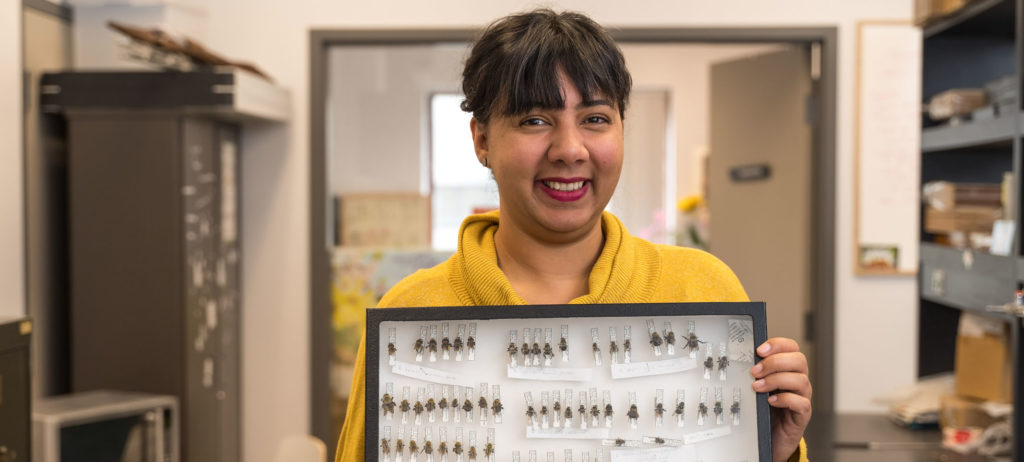
Pictured here: Sheila Colla
Following the plight of the bumblebee and other bee species
Bees – including more than 850 species native to Canada – are key members of our ecosystem: they provide essential services through their role in the pollination of agricultural crops, urban garden plants and wild plants. Yet, during recent decades, there has been evidence of declines in the health and diversity of wild bees.
The principal investigators for York University’s Centre for Bee Ecology and Evolution (BEEc) have joined together to apply their collaborative efforts to the development of policies and environmental management for the long-term sustainability of bees and the vital ecosystem services they provide. They explore bee health through the lenses of biology, diversity, ecology, mathematics, statistics and socio-ecological systems. As they study wild and managed bee populations, the researchers hope to “support evidence-based decision making and recommendations for sustainable practices in agricultural, urban, and natural ecosystems.”
The centre was formed a few years ago – “when there was a critical mass of us,” says Sheila Colla, an associate professor in the Faculty of Urban and Environmental Change (EUC) and one of the BEEc’s five principal investigators. “We are building on a longer history of bee research at York.”
The five BEEc principal investigators have complementary research interests. Amro Zayed, the York Research Chair in Genomics and BEEc director, uses genomics to understand why native bees and honey bees are declining, and develops tools to overcome these declines. Sandra Rehan, an associate professor of biology; is an expert on social insect genomics and pollinator health. Laurence Packer, a Distinguished Research Professor at York, conducts research that focuses on bee systematics, phylogeny, taxonomy (including DNA barcoding) and biogeography; he also has built and continues to maintain the largest Canadian collection of bees from around the world – approximately 300,000 specimens.
Colla, York Science and an associate professor in the Faculty of Environmental and Urban Change, studies the variety of factors affecting native bee decline, and develops conservation efforts for these important pollinators with a special focus on at-risk bumble bees. Jane Hefferman, a professor in the Department of Mathematics and Statistics and director of York University’s Center for Disease Modelling, is applying her modelling skills to help understand how pathogens and pests affect colony health.
With assistance from colleagues from within and outside of York University, research associates, student researchers and industry partners, BEEc principal investigators collaborate on research, write papers and co-supervise students. As pandemic restrictions wane, they are beginning to apply for research grants together. Monthly educational webinars featuring guest experts is one of the centre’s popular offerings; BEEc sponsors an annual conference and the members also do outreach and public education.
As the centre’s work gains increasing respect and funding; its “colony” of researchers appears to be thriving.

















